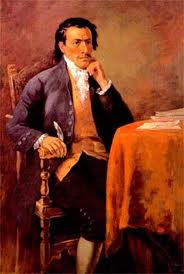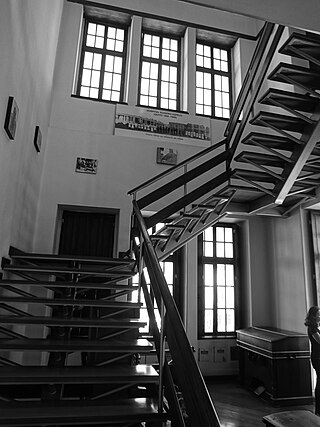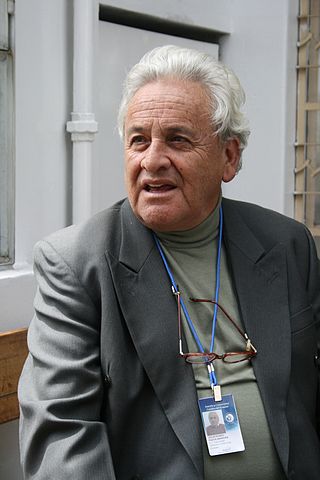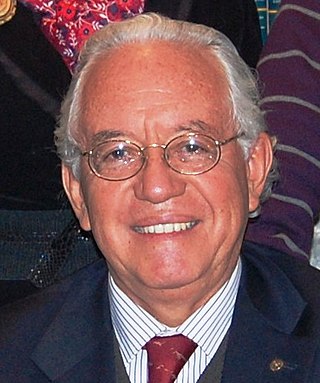The Premio Nacional Eugenio Espejo is the national prize of the nation of Ecuador. Decrees 677 and 699 established the prize, which is conferred by the President of Ecuador. The Award is bestowed every other year. Finalists for receiving the award are put on a short list by the National Council of Culture, and grouped into five categories:

Francisco Javier Eugenio de Santa Cruz y Espejo was a medical pioneer, writer and lawyer of criollo origin in colonial Ecuador. Although he was a notable scientist and writer, he stands out as a polemicist who inspired the separatist movement in Quito. He is regarded as one of the most important figures in colonial Ecuador. He was Quito's first journalist and hygienist.

Theo Constanté Parra was a master Latin American painter part of the Abstract Informalist Movement in Ecuador. In 2005, Constanté won the country's most prestigious award for art, literature and culture, the Premio Eugenio Espejo National Award, presented by the President of Ecuador. Constanté's works are abstract in nature and consist of many colors which meld together amongst loosely drawn geometric lines. Constanté stated that his favorite colors were red, orange and blue and they are the colors that are typically more dominant in his work.
Carlos Catasse, born Carlos Tapia Sepúlveda in Santiago, Chile, formed his new last name by combining the first two letters of his first, middle and last names. Catasse is a Chilean painter of international recognition. Since 1969, he has lived and painted in Quito, Ecuador, the country that in 1986 granted him with Ecuador's National Prize for Painting, the Premio Eugenio Espejo. Catasse has had a great number of individual exhibitions throughout Latin America, as well as, Switzerland, Italy, Germany, Spain, and the United States. After Catasse died in Quito, Ecuador at the age of 65, his remains were cremated in a cemetery in the Ecuadorian capital, and there are plans to open a gallery exhibition of his works.

Leopoldo Benites was an Ecuadorian diplomat who served as the 28th President of the United Nations General Assembly in 1973. He had been the permanent representative of Ecuador since October 1960.

The Ecuador National Museum of Medicine is located in Quito, Ecuador.

Rodolfo Pérez Pimentel is an Ecuadorian lawyer, historian, and biographer. He was declared the lifetime chronicler of the city of Guayaquil, and is a member of the National Academy of Ecuadorian History. He was the 2005 recipient of the Premio Eugenio Espejo in Literature, awarded to him by President Alfredo Palacio.
Luis Enrique Fierro is an Ecuadorian medic and poet.

Julio Pazos Barrera is a poet, writer, teacher, and cook.

Jaime Galarza Zavala was an Ecuadorian writer, poet, journalist and politician.
Alfredo Palacio Moreno was an Ecuadorian sculptor and painter.
Hernan Crespo Toral was an Ecuadorian architect, archeologist and museologist who played an important role in the conservation of cultural heritage in Ecuador.
Diego Luzuriaga is an Ecuadorian composer of classical music.

Alfonso Rumazo González was an Ecuadorian writer, historian, essayist and literary critic.
Misael Acosta Solís was an Ecuadorian naturalist.

Veronica Bonilla is a children's writer, illustrator, and graphic designer from Ecuador. She was born on 11 June 1962 in Quito D.M. and has published children's literature since 2012. She has 71 international book registers ISBN in several formats, in paper as well as in digital format. She publishes in both Spanish and English, and she also has produced audiobooks.
Juan Valdano Morejón is an Ecuadorian writer. He was born in Cuenca in 1939. He studied at the University of Cuenca, Complutense University of Madrid and the University of Aix-en-Provence. He taught literature and literary theory at the University of Cuenca and at the Pontificia Universidad Católica del Ecuador.
Katya Susana Romoleroux is an Ecuadorian botanist. In 2020, she was awarded the 29th Eugenio Espejo National Prize for her lifelong contribution to science in Ecuador.

Marcelo Cruz Utreras is an Ecuadorian neurologist and politician.
Álvaro Manzano Montero was an Ecuadorian opera and symphony orchestra conductor.










